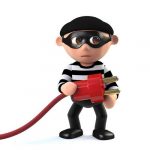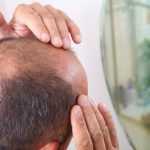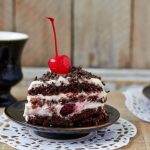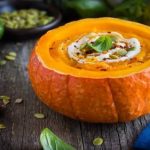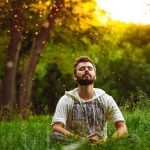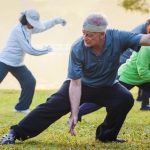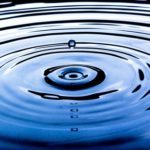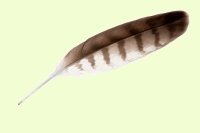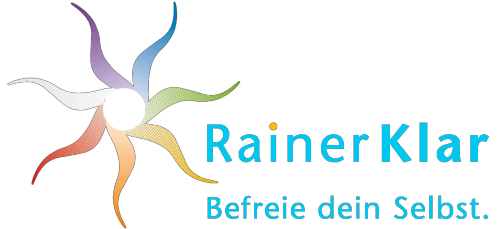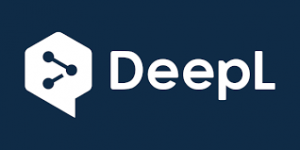...and our daily calorie intake?
In any case, much lower than the official nutrition tables claim. As long as we believe in the calorie theory, we tend far too often to eat more than is good for us. But this theory is basically wrong.
According to the current tables, I would need, for example, 64 g of protein and 2300 kcal daily.
According to Dr. Galina Shatalova , we need less than 30 g of protein and 1000 kcal daily.
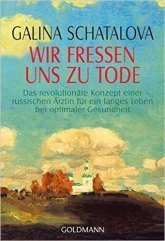 This she proves impressively in her book We eat ourselves to death - The revolutionary concept of a Russian doctor for a long life with optimal health. The title is rather drastic, isn't it? But doesn't it describe unvarnishedly how things are in our civilization?
This she proves impressively in her book We eat ourselves to death - The revolutionary concept of a Russian doctor for a long life with optimal health. The title is rather drastic, isn't it? But doesn't it describe unvarnishedly how things are in our civilization?
And the book content is anything but lurid.
On the contrary, the author is a committed scientist who, at the age of 75, is not afraid to walk 500 km through the desert together with her subjects.
I have not yet walked through the desert. But for years I have been conducting self-experiments to find out which diet is really healthy for me and which mental influences are at work in my eating behavior.
For example, I found out that carbohydrates in the form of bread or cereal products in general gave me a noticeable belly and made me tired immediately.
Recently I became acquainted with the nourishing Coaching of Patric Heizmann. This concept is obviously very successful in helping a number of people lose weight and improve their health without dieting.
Reduce carbohydrates and eat more protein?
One of Patric Heizmann's rules, for example, is to reduce carbohydrates and eat more protein. Ulrich Strunz also writes this in Frohmedizin.
I can well imagine that this will work.
A couple of years ago I talked to a snack bar owner who was on a "steak diet". He had bought too much and in the following years he lived almost exclusively on this steak depot. And he lost a lot of weight.
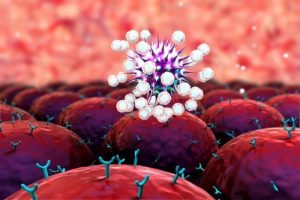
When following the Heizmann rule, I quickly realize: it's not really good for me to eat more protein. Even though I live vegan and it's not hard-to-digest animal protein.
It makes me clumsy and tired and I eliminate unpleasant body odors and "cheese" (cheese feet, athlete's foot).
Well, for me, it's more like
Less grain YES. More protein NO.
I must admit that Patric Heizmann impressed me with his success. But he says himself that everyone can personally find his suitable diet, without dieting and hunger-pushing. And my suitable diet is not only beyond a lot of cereals, but also a lot of proteins.
At the same time, I am increasingly enjoying carbohydrates in the form of fresh fruit!
Am I not harming myself by not following the generally accepted requirement rules?
For an unequivocal answer it needs clarification whether they are really still valid today.
"According to my age, I should be sitting at home knitting socks, but I am constantly on the move. In the last four years alone, I crossed the sandy deserts of Central Karakum and Kysylkum on foot four times. With a group of like-minded people, I made a mountain trek from Nalchik to Pizunda, crossing four mountain passes. We were on the road for 23 days, and our daily ration consisted of 50 to 100 grams of buckwheat and 100 grams of dried fruit. We arrived in Pizunda just as spry as we had set out, while random companions literally collapsed from exhaustion."
Galina Shatalova: Food is not the only source of energy
I personally call them the "Boiler Theory"... It is based on the idea that the energy consumption of humans is covered exclusively by the energy of the nutrients they consume ... Humans "feed" the "heating plant" of their organism with the necessary amount of nutrients, these are burned, and the energy released in the process compensates for the entire energy expenditure.
Proteins are produced in the colon
The Russian doctor proves that we have other sources of energy, similar to plants that feed largely on sunlight. This alone means that we need less food than according to the calorie theory.
In addition, it makes us aware of other very significant relationships:
Russian scientists found in experiments that those who eat little protein exhale less nitrogen than they inhale. That is, some of the nitrogen remains in the body.
In contrast, those who eat a lot of protein actually exhale more nitrogen than they inhale!
This indicates firstly a protein surplus in the second group, and secondly it leads to the - also scientifically proven - realization that proteins are produced in the body, namely in the large intestine.
And it is precisely for this purpose that we need the nitrogen that is abundant in the air we breathe.
According to Galina Shatalova, a central function of the large intestine is the production of proteins with the help of the bacteria cultures present.
Result: We need to consume much less protein than we previously thought, because enough is produced in the body.
And this is by no means an unproven theory, but more than powerfully substantiated by numerous experiments by Galina Shatalova. For example, she had 4 sport-active subjects participate in a super marathon over 500 km (!), with a daily ration of no more than 1200 kcal (compared to the standard of the other athletes: 6000 kcal).
While the control group reached the finish of the stage exhausted, their protégés were as fit as a fiddle and even had muscle growth!
For them this is proof that we need much less food and also save valuable energy if we do not have to digest more than necessary.
Light food disproves calorie and protein theory
More than 20,000 people worldwide now feed exclusively on LIGHT. In doing so, they are proving very practically that there is a whole other source of energy available to us, beyond our physical foods.
Why do we find it so difficult to curb our food requirements? How many times have we read that we need much less, and that we would even be much better off for it?
Don't our fat bellies speak a clear language?
So why?
 One cause is the socially established habit that celebrates its heyday both in social gatherings and alone at home.
One cause is the socially established habit that celebrates its heyday both in social gatherings and alone at home.
We experience that eating is much more fun in company. In the process, we quickly forget all our resolutions to really eat less next time and to chew more slowly!
And alone at home: Isn't the pantry and refrigerator too close for you to be able to discipline yourself without any problems?
Cause lack consciousness
Basically, it is so clear that it literally jumps out at everyone: We eat far too much, either because exactly the necessary substances are not contained in our civilization food, or because we are afraid of not getting them.
Maybe we have already eaten more than enough protein, but some article about protein or vital substance deficiency triggers a certain worry that it might still not be enough.
Where do such fears come from? We sometimes suck them up with our mother's milk. Civilization and especially advertising do the rest.

A basic strategy of advertising is to create a sense of lack, which you "with product "A," easily."
Unfortunately, product "A" is not a food we really need. It is - like most other products on the supermarket and pharmacy shelves - artificially industrially produced.
Not infrequently, addictive substances are added so that we don't get the idea of eating fruit, vegetables or nuts again, as nature gives us.
But why do we fall for this advertising?
Because we are not sufficiently connected with ourselves and our bodies. Before we listen to the voice of the body, other voices have usually drowned it out loud.
Also, our eating behavior is often characterized by compensation. Keyword "frustration eating".
In general, we tend to eat too much when we are not in love. Otherwise, "air and love" would actually be almost enough. You've probably experienced this phenomenon when you were in love, right?
How do we break away from eating a lot?
If we already cultivate a much-eating habit for decades, it takes some discipline to get into a new lane. At the latest "diseases" can be used as helpers. Because they show us quite exactly what is wrong, out of control or blocked.
We are led by it to soul causes, in order to clear these in suitable way, to redeem.
This is a good time to make a lasting correction to your diet.
Final recommendations
The book of Dr. Galina Shatalova is highly recommended. Especially if you are plagued with more serious "diseases", you will learn how the Russian doctor was able to help even seriously ill people back on their feet.
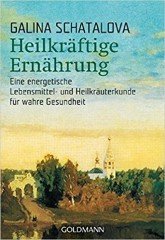 The goals of their concept also include healthy breathing, and deep abdominal breathing 4 - 6 times per minute. This is made possible by gradual purification.
The goals of their concept also include healthy breathing, and deep abdominal breathing 4 - 6 times per minute. This is made possible by gradual purification.
Also, enough daily exercise and hardening against cold and heat is immensely important for her to successfully stay healthy until the end of physical life.
If you are interested in exploring this topic in more depth, you can also read her book Healing Nutrition, which I also highly recommend.
In this book she also writes more extensively about the subject of bread. Very revealing are her self-experiments as well as the treatment of a "sick person", the "would rather die than give up bread".
I also invite you to browse this blog. You will find inspiring articles about nutrition, healing, health, rejuvenation and the power of thought.
These articles fit the topic well:

